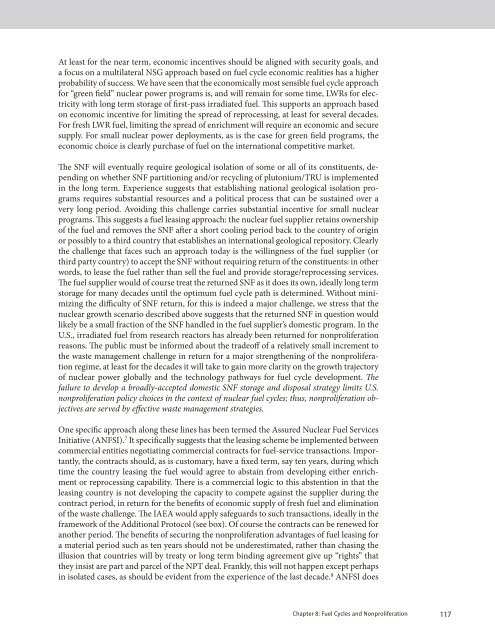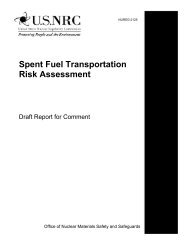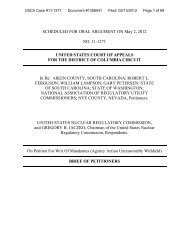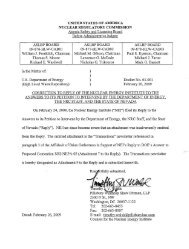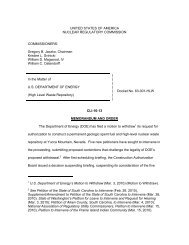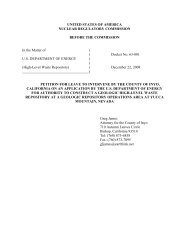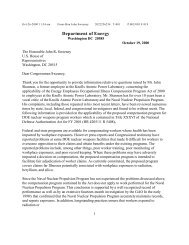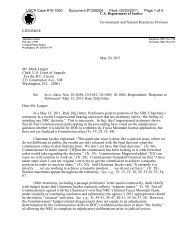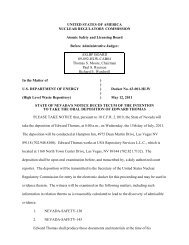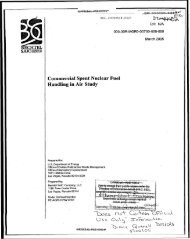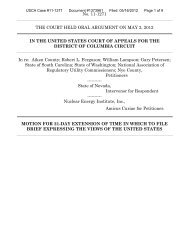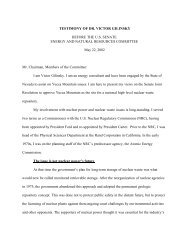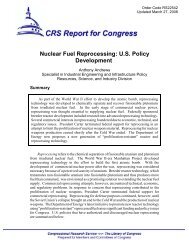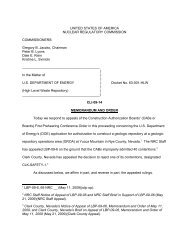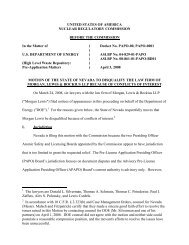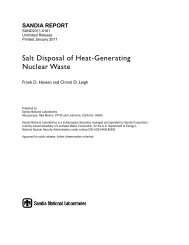The FuTure oF nuclear Fuel cycle - MIT Energy Initiative
The FuTure oF nuclear Fuel cycle - MIT Energy Initiative
The FuTure oF nuclear Fuel cycle - MIT Energy Initiative
You also want an ePaper? Increase the reach of your titles
YUMPU automatically turns print PDFs into web optimized ePapers that Google loves.
At least for the near term, economic incentives should be aligned with security goals, and<br />
a focus on a multilateral NSG approach based on fuel <strong>cycle</strong> economic realities has a higher<br />
probability of success. We have seen that the economically most sensible fuel <strong>cycle</strong> approach<br />
for “green field” <strong>nuclear</strong> power programs is, and will remain for some time, LWRs for electricity<br />
with long term storage of first-pass irradiated fuel. This supports an approach based<br />
on economic incentive for limiting the spread of reprocessing, at least for several decades.<br />
For fresh LWR fuel, limiting the spread of enrichment will require an economic and secure<br />
supply. For small <strong>nuclear</strong> power deployments, as is the case for green field programs, the<br />
economic choice is clearly purchase of fuel on the international competitive market.<br />
<strong>The</strong> SNF will eventually require geological isolation of some or all of its constituents, depending<br />
on whether SNF partitioning and/or recycling of plutonium/TRU is implemented<br />
in the long term. Experience suggests that establishing national geological isolation programs<br />
requires substantial resources and a political process that can be sustained over a<br />
very long period. Avoiding this challenge carries substantial incentive for small <strong>nuclear</strong><br />
programs. This suggests a fuel leasing approach: the <strong>nuclear</strong> fuel supplier retains ownership<br />
of the fuel and removes the SNF after a short cooling period back to the country of origin<br />
or possibly to a third country that establishes an international geological repository. Clearly<br />
the challenge that faces such an approach today is the willingness of the fuel supplier (or<br />
third party country) to accept the SNF without requiring return of the constituents: in other<br />
words, to lease the fuel rather than sell the fuel and provide storage/reprocessing services.<br />
<strong>The</strong> fuel supplier would of course treat the returned SNF as it does its own, ideally long term<br />
storage for many decades until the optimum fuel <strong>cycle</strong> path is determined. Without minimizing<br />
the difficulty of SNF return, for this is indeed a major challenge, we stress that the<br />
<strong>nuclear</strong> growth scenario described above suggests that the returned SNF in question would<br />
likely be a small fraction of the SNF handled in the fuel supplier’s domestic program. In the<br />
U.S., irradiated fuel from research reactors has already been returned for nonproliferation<br />
reasons. <strong>The</strong> public must be informed about the tradeoff of a relatively small increment to<br />
the waste management challenge in return for a major strengthening of the nonproliferation<br />
regime, at least for the decades it will take to gain more clarity on the growth trajectory<br />
of <strong>nuclear</strong> power globally and the technology pathways for fuel <strong>cycle</strong> development. <strong>The</strong><br />
failure to develop a broadly-accepted domestic SNF storage and disposal strategy limits U.S.<br />
nonproliferation policy choices in the context of <strong>nuclear</strong> fuel <strong>cycle</strong>s; thus, nonproliferation objectives<br />
are served by effective waste management strategies.<br />
One specific approach along these lines has been termed the Assured Nuclear <strong>Fuel</strong> Services<br />
<strong>Initiative</strong> (ANFSI). 7 It specifically suggests that the leasing scheme be implemented between<br />
commercial entities negotiating commercial contracts for fuel-service transactions. Importantly,<br />
the contracts should, as is customary, have a fixed term, say ten years, during which<br />
time the country leasing the fuel would agree to abstain from developing either enrichment<br />
or reprocessing capability. <strong>The</strong>re is a commercial logic to this abstention in that the<br />
leasing country is not developing the capacity to compete against the supplier during the<br />
contract period, in return for the benefits of economic supply of fresh fuel and elimination<br />
of the waste challenge. <strong>The</strong> IAEA would apply safeguards to such transactions, ideally in the<br />
framework of the Additional Protocol (see box). Of course the contracts can be renewed for<br />
another period. <strong>The</strong> benefits of securing the nonproliferation advantages of fuel leasing for<br />
a material period such as ten years should not be underestimated, rather than chasing the<br />
illusion that countries will by treaty or long term binding agreement give up “rights” that<br />
they insist are part and parcel of the NPT deal. Frankly, this will not happen except perhaps<br />
in isolated cases, as should be evident from the experience of the last decade. 8 ANFSI does<br />
chapter 8: <strong>Fuel</strong> <strong>cycle</strong>s and nonproliferation 117


